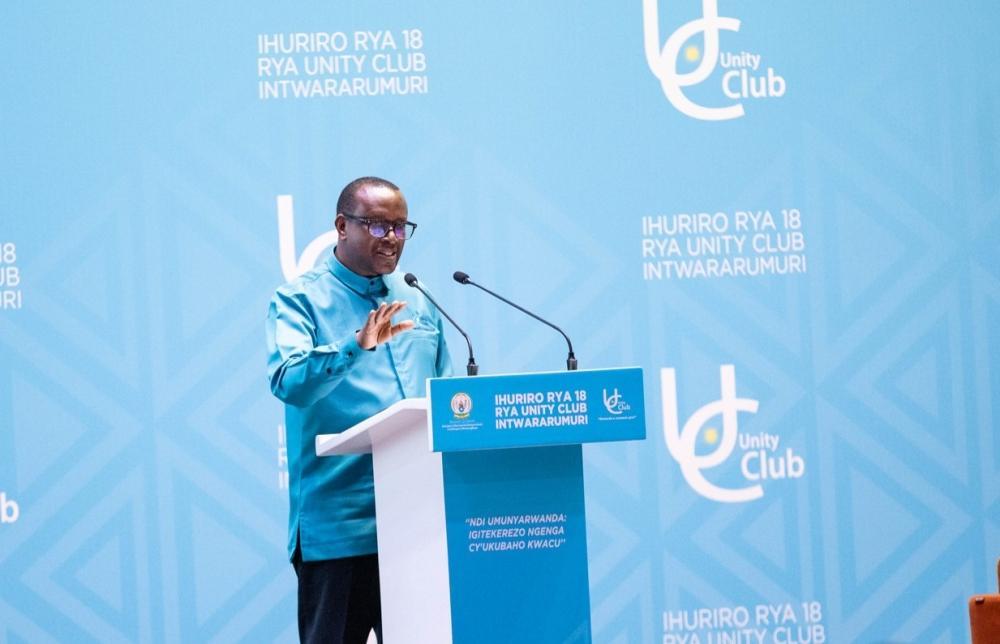Africa-Press – Rwanda. Rwanda’s National Unity and Reconciliation Barometer has risen to 95.3 percent, reflecting continued progress in strengthening unity, reconciliation, and resilience across the country, according to a new report by the Ministry of National Unity and Civic Engagement.
The findings presented during the 18th edition of the Unity Club Intwararumuri Annual Forum on Saturday, November 8, show that unity and reconciliation have grown by 13 percentage points since 2010.
This reflects Rwanda’s continued progress in rebuilding national trust and cohesion, according to the Minister of National Unity and Civic Engagement, Jean Damascene Bizimana.
The 2025 barometer shows a 0.6 percent increase from the 94.7 percent recorded in 2020. It assessed the current state of unity, reconciliation, and resilience among Rwandans, identified challenges hindering progress, and proposed recommendations to preserve unity and strengthen national resilience.
According to Bizimana, the index serves as an important tool to assess the current state of unity, reconciliation, and resilience, while also identifying challenges and proposing actionable recommendations to strengthen national cohesion.
“The state of unity and reconciliation in Rwanda is at a commendable level,” said Bizimana. “The barometer has shown steady improvement, from 82.3 percent in 2010 to 92.5 percent in 2015, and now 95.3 percent in 2025.”
Three pillars
The 2025 edition of the barometer introduced a new dimension by anchoring its findings on three interlinked pillars: Unity, Reconciliation, and Resilience.
“Unity and Reconciliation remain the main pillars because they are connected to the social relationships, shared history, and collective efforts Rwandans have invested in rebuilding themselves after the Genocide against the Tutsi,” Bizimana explained. “Resilience was added because it is the foundation upon which unity and reconciliation are built.”
The study surveyed 12,300 people across the country, representing different sectors, professions, religions, age groups, and genders.
Bizimana noted that the decision to expand the barometer was informed by emerging challenges that continue to threaten unity and reconciliation, such as violence against Genocide survivors, the spread of Genocide ideology on social media, especially from outside Rwanda, harmful beliefs within some religious groups, and the erosion of Rwandan cultural values, particularly among the youth.
Key findings
The report provides a detailed picture of how Rwandans express a sense of unity, reconciliation, and shared identity.
Unity scored 95.6%, Reconciliation recorded 95%, Heroism and Patriotism reached 98.7%, while Rwandan Traditions, Beliefs, and Taboos scored 97.9%.
Additionally, Shared Ancestry registered 96.8%, the role of Rwandan values in preserving unity stood at 95.9%, and the impact of the Genocide against the Tutsi on destroying unity was recorded at 92.6%.
Furthermore, the role of political parties and the First and Second Republics in dividing unity scored 91%, while the importance of commemorating the Genocide in building reconciliation reached 99%.
Social cohesion scored 98.5%, inclusion and freedom in Rwandan society stood at 95.9%, and participation in cooperative and savings groups, regardless of background, registered 94%.
Meanwhile, equal rights for all Rwandans scored 92%, and shared understanding of history and a common vision for the future recorded 90.6%.
Persistent challenges
Despite these gains, the report highlights areas that still need special attention. Among the respondents, 23 percent confirmed that Genocide ideology is still present in their communities, while 38 percent said some individuals continue to hold ethnic-based or discriminatory ideologies.
The study also found that 45.1 percent of respondents believe wounds from the 1994 Genocide against the Tutsi remain unhealed among survivors. This finding aligns with a 2023 Unity Club study, which showed that healing among youth survivors stood at 31 percent.
Bizimana expressed concern over the influence of social media platforms that distort Rwanda’s history and spread misinformation, misleading especially the younger generation.
“Platforms are operating from outside Rwanda that continue to twist facts and undermine the country’s unity and progress,” he said.
Meanwhile, the barometer outlined nine key recommendations to further strengthen unity, reconciliation, and resilience.
These include promoting Rwandan values and culture among the youth by teaching Kinyarwanda and Rwandan history as core elements of national identity, encouraging young people to actively participate in initiatives that foster unity within families, communities, and workplaces.
There’s also investing in inclusive local dialogues that promote open discussions about Rwanda’s history, encouraging honest conversations about the roles individuals and families played during the Genocide against the Tutsi, among other initiatives.
Bizimana noted that continued improvement in Rwanda’s unity and reconciliation reflects the government’s sustained efforts to promote peaceful coexistence, equal opportunities, social justice, and inclusive development.
“The progress we see today is the result of deliberate policies that bring Rwandans together,” he said. “But there is still work to do to ensure that no remnants of division or discrimination are allowed to take root again.”
For More News And Analysis About Rwanda Follow Africa-Press






